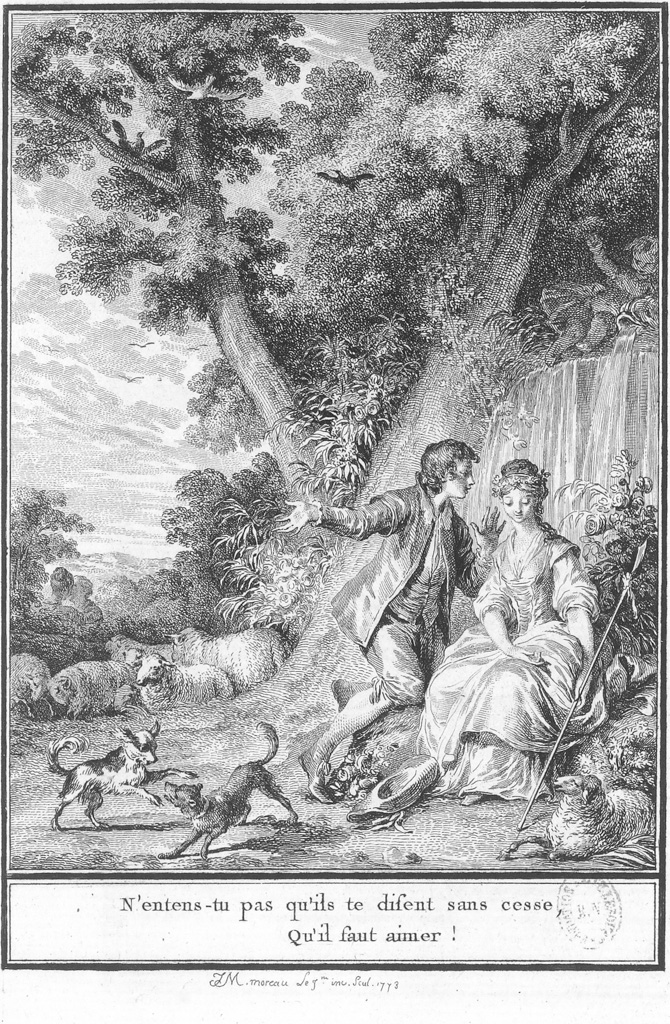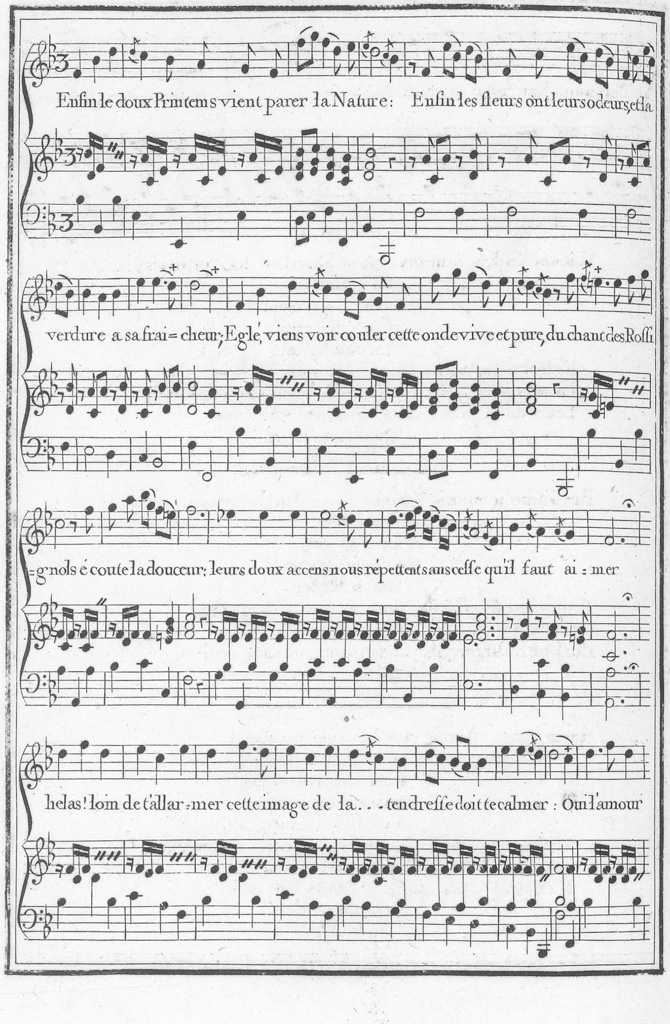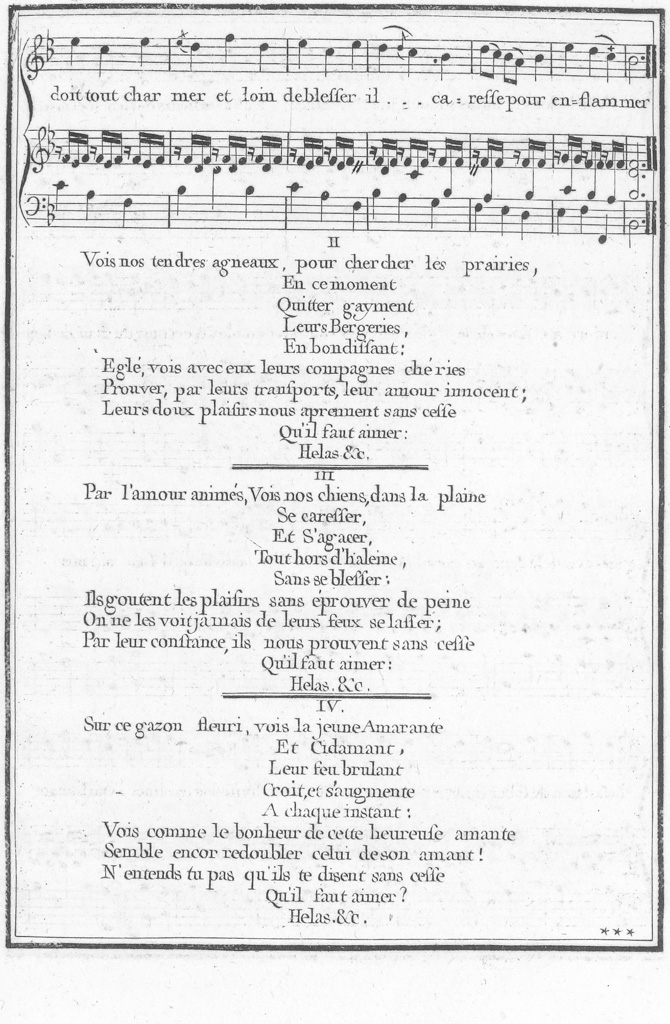


Look:
View Image(s): Chantilly, 1773, Compare
Image Metadata:
Image Description:
Plate Signature: “JM. moreau Le Jne. inv. Scul. 1773”
Artist: “Moreau, Jean Michel”
Engraver: “Moreau, Jean Michel”
Year: 1773
Inscription: “N’entens-tu pas qu’ils te disent sans cesse, / Qu’il faut aimer!”
Keywords: birds (animals), cascades (water features), couples, courtship, day (time of day), dogs (species), dolphins (animals), exterior, flocks, fountains, giant reed, kissing, lambs, lovers, nightingales (birds), pastoral, peasants, putti (children), Rosa (genus), sculpture (visual works), sheep (genus), shepherdesses, shepherds, shepherd’s staffs, shrubs, statues, terriers, trees, waterfalls (natural bodies of water), bergère hats
Texts which refer to this image: Mahérault, L’oeuvre de Moreau le jeune, 25
Other works of art quoted in this image:
General Metadata:
Group Page Range: Vol. 1, 30-34
Title Page Inscription: “LES PLAISIRS / DU / PRINTEMS”
Published Notes:
The Choix de chansons does not list an author for the text of song 2. A song with the same incipit is published in Jean-Joseph Mouret, Second recueil d’airs serieux et a boire a une et deux voix avec des accompagnements par Mr Mouret (Paris: Mouret, c. 1719) (see BnF catalogue) and again under the title “Le deffi” in Nouveau recueil de chansons choisies volume 2 (The Hague: J. Neaulme, 1724). The BnF catalogue entry for this second publication attributes the song to composer Jean-Joseph Mouret (see BnF catalogue). It has not yet been possible to examine these two publications to verify whether or not the songs in these two publications are the same as that in the Choix de chansons or if they only have the same incipit. However, the text of the Choix de chansons song is published in another publication, Le Chansonnier français volume 3 (1760), under the title “Le défi,” accompanying a different score (see page 163, and notation page 36, no. 86). This suggests that the text of the song in the 1719 and 1724 publications is the same as that in the 1760 publication and the Choix de chansons, indicating that Laborde is not the author of the text. It is possible that Mouret wrote the text but it is equally possible that he adapted pre-existing text to his own composition. Consequently, I have listed the author of the song as unknown, although we have attributed every other song text marked with asterisks to Laborde. Christina Clarke
Listen:
View Score(s): 1773
Song 1 recording: Enfin le doux printems
Song 2 recording: Tu dis partout que je suis sage
Credit: Paul McMahon, tenor
Amy Moore, soprano
Erin Helyard, harpsichord (French double by Carey Beebe after Blanchet, 1991)
Temperament: Jean-Henri Lambert, 1774, A:392
Song 1 diction recording:
Song 2 diction recording:
Credit: Eighteenth-century diction prepared and declaimed by Linda Barcan with the assistance of Erin Helyard and Veronique Duche
Music Metadata:
Song 1 Description:
S.1.05.1.mid
S.1.05.2.mid
Song 1 Composer: [Laborde, Jean-Benjamin de]
Song 1 Key Signature: Bb
Song 1 Time Signature: 3
Song 1 Expression Marks: [none]
Song 1 Tessitura of Voice: f1-bb2
Song 1 Tessitura of Instrument: Bb1-c2
Song 1 Strophic: Strophic
Song 1 Related Compositions:
Song 2 Description:
Song 2 Composer: [Laborde, Jean-Benjamin de]
Song 2 Key Signature: C
Song 2 Time Signature: 2
Song 2 Expression Marks: Andante
Song 2 Tessitura of Voice: c1-a2
Song 2 Tessitura of Instrument: E-g2
Song 2 Strophic: Non-strophic
Song 2 Related Compositions:
Read:
Song 1 Transcription:
I
Enfin le doux Printems vient parer la Nature:
Enfin les fleurs
ont leurs odeurs,
et la verdure
a sa fraicheur;
Eglé, viens voir couler cette onde vive et pure,
du chant des Rossignols écoute la douceur;
leurs doux accens nous répettant sans cesse
qu’il faut aimer
helas! loin de t’allarmer
cette image de la tendresse
doit te calmer:
Oui l’amour doit tout charmer
et loin de blesser il caresse
pour enflammer
II
Vois nos tendres agneaux, pour chercher les prairies,
En ce moment
Quitter gayment
Leurs Bergeries,
En bondissant:
Eglé, vois avec eux leurs compagnes chéries
Prouver, par leurs transports, leur amour innocent;
Leurs doux plaisirs nous aprennent sans cesse
Qu’il faut aimer:
Helas. &c.
III
Par l’amour animés, Vois nos chiens, dans la plaine
Se caresser,
Et S’agacer,
Tout hors d’haleine,
Sans se blesser:
Ils goutent les plaisirs sans éprouver de peine
On ne les voit jamais de leurs feux se lasser;
Par leur constance, ils nous prouvent sans cesse
Qu’il faut aimer:
Helas. &c.
IV
Sur ce gazon fleuri, vois la jeune Amarante
Et Cidamant,
Leur feu brulant
Croit, et s’augmente
A chaque instant:
Vois comme le bonheur de cette heureuse amante
Semble encor redoubler celui de son amant!
N’entends tu pas qu’ils te disent sans cesse
Qu’il faut aimer?
Helas. &c.
Song 2 Transcription:
Tu dis par tout que je suis sage,
pour un tendre Berger
c’est un outrage,
Dont je prétens dont je prétens me venger.
Rends-toi, Bergére dans le prochain Verger;
je te laisse le choix de la fougere
ou du tendre gazon,
pour m’en faire raison,
Pour m’en faire raison.
Text Metadata:
Song 1 Text Description:
Song 1 Incipit: Enfin le doux printems
Song 1 Author: “Laborde, Jean-Benjamin de”
Song 1 Text Keywords:
Sources that refer to song 1 text:
Sources that song 1 text refers to:
Song 2 Text Description:
Song 2 Incipit: Tu dis partout que je suis sage
Song 2 Author: Unknown
Song 2 Keywords:
Sources that refer to song 2 text: Nouveau recueil de chansons choisies 2, 47. Le Chansonnier français 3, 163, & “Airs” page 36, no. 86.





